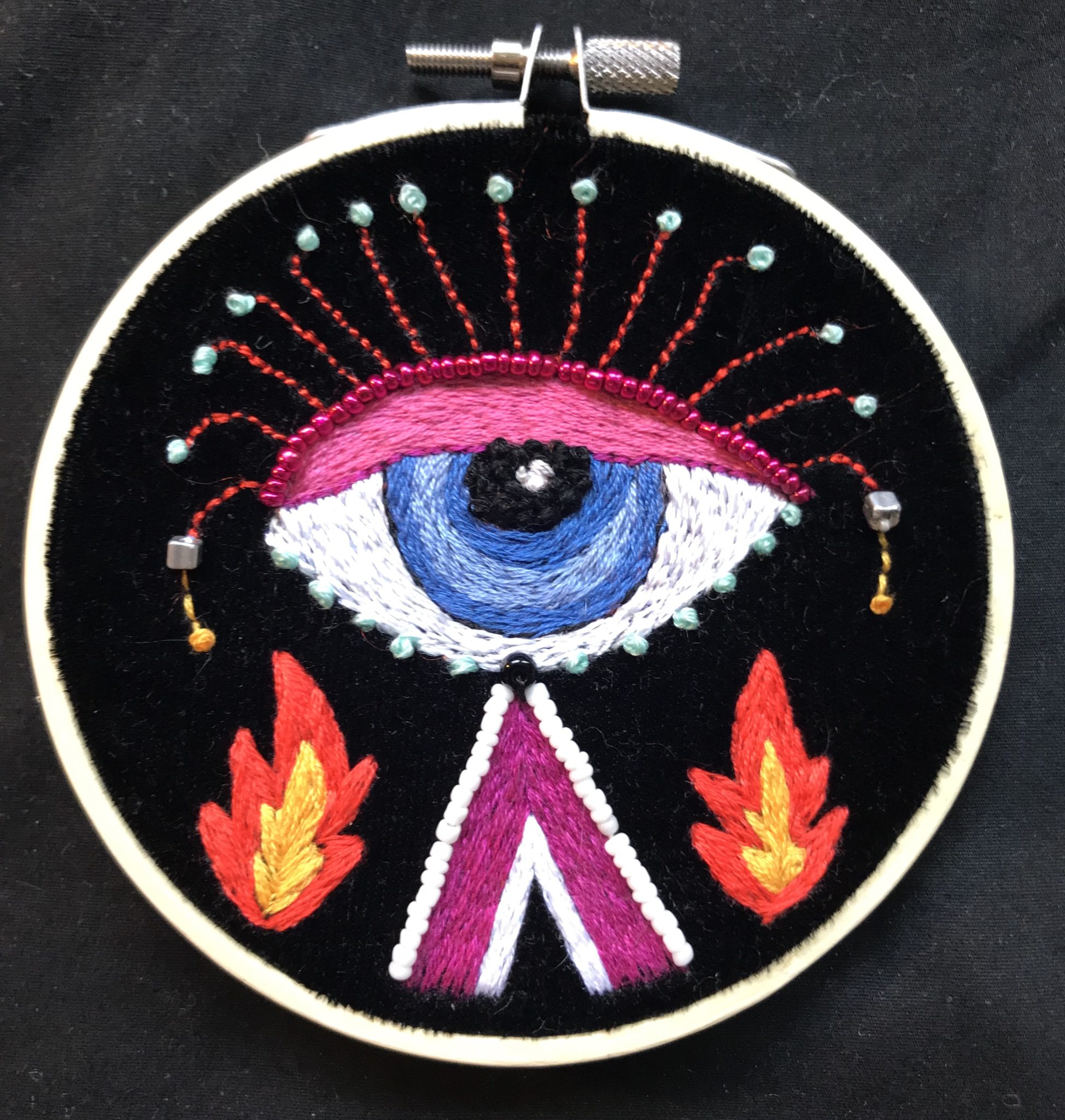
Courtesy of Michelle Beaulieu-Morgan
To the unobservant, the Whitney Humanities Center gallery can appear to be simply the hallway in front of the administration desk. But when one steps inside the hall and continues to the conference room at the end, one can find a collection of colors in the form of ornate embroidery.
An exhibition of Michelle Beaulieu-Morgan’s GRD ’17 work will be on view in the Whitney Humanities Center gallery from Sept. 10 to Dec. 11. This exhibit, entitled “Material Obsessions,” explores embroidery as a medium to contemplate family history, queer subjectivity, substance abuse and compulsion.
Beaulieu-Morgan said that embroidery and other forms of textile work have long been stitched into the history of queer art.
“I think the reason queer artists have embraced embroidery and textile art so fully is because of the tensions already inherent in the relationships between families, desires, sex relationships and domesticity,” Beaulieu-Morgan said. “Queerness is about, well, ‘queering’ those things. Nothing is more domestic and constitutive and representative of family, sex relations and domesticity than fiber arts. But embroidery has always been a little bit ‘extra’ — it only makes sense that queer artists would embrace it as a way to make that extra our own.”
Beaulieu-Morgan, a digital accessibility specialist at the University, finished her Ph.D. in American Studies at Yale in 2017. The title of the exhibition on view is a riff on the title of her dissertation, “Material Possessions,” which explores how 19th-century Americans used material substances to understand race and class structures.
“That project arose from my experiences as the daughter of working class people who were not college educated and made a living out of working with materials as carpenters and ship builders,” Beaulieu-Morgan said. “I have always had an interest in how the things we make make us and so on, whether academically or not.”
According to the Whitney Humanities Center website, the gallery space began showing art in 2007 and is committed to displaying “paintings, photographs and works on paper by artists affiliated with Yale or the larger Yale–New Haven community.” The exhibitions are “designed to complement the programming of the Whitney Humanities Center, as well as the research and teaching interests of Yale faculty.”
Beaulieu-Morgan pays homage to the academic texts that shaped her in a work entitled “Queer History” placed at the front of the exhibit. “Queer History” is a quilt comprised of index cards, each with the name of a queer academic text and Beaulieu’s handwritten synopsis of the text. The quilt literally stitches together her studies of queer academics, writing their own histories.
Two works in the exhibit, “You’re Only as Sick as Your Secrets” and “I Was Drunk My Son’s Entire Childhood,” extend the exhibit’s theme of genealogy. Beaulieu-Morgan embroidered on linens that were previously embellished by her maternal great-grandmothers, one of which worked in a textile mill. According to the exhibit text, the works were a way for Beaulieu-Morgan to explore how shame functions as a societal mechanism of control for women. The lineage linens allowed Beaulieu-Morgan to contend with histories of female shame in her own family.
Located near the end of the exhibit are selections from Beaulieu-Morgan’s “Queer Landscape” collection. Each piece represents an interior landscape of queer desire. The “Queer Landscape” collection addresses the broader exhibit’s theme of excessiveness — particularly the perception that queer identity begets excessiveness — what Beaulieu-Morgan refers to as “too muchness.” The pieces are vibrant and densely packed with floral imagery.
“I eventually became an embroidery artist because the materials are extremely cheap and readily available and because I could take them with me and work on them nearly anywhere,” Beaulieu-Morgan said. “These pieces were all in some way made in public and I think that’s crucial to understanding what I do as a whole. I feel good about the act of creating in public, which embroidery allows even as it’s associated with women tucked away in some corner at home.”
Beaulieu-Morgan’s current project also works with textiles, although in a different tradition. This project is a narrative quilting hoop regarding her experiences with alcoholism.
The gallery space is open to the public on Mondays and Wednesdays from 3 to 5 p.m.
Rianna Turner | rianna.turner@yale.edu







